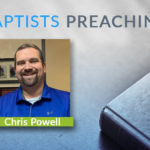Ross Shelton is pastor of First Baptist Church in Brenham, where he has served three years. From deep in the heart of one Texan, he shares his background and thoughts on ministry. To suggest a Baptist General Convention of Texas-affiliated minister to be featured in this column, or to apply to be featured, click here.
Background
• Where else have you served in ministry, and what were your positions there?
I have served as the pastor of First Baptist Church in Castroville, 2004-2007, and First Baptist Church in Woodville, 2007-2013.
• Where did you grow up?
I grew up in Houston.
• How did you come to faith in Christ?
At age 9, I came under conviction that I was a sinner and was ready to receive Christ, by faith, as my Savior. My mom set up a time to talk with our pastor, Lester Collins of Tallowood Baptist Church in Houston. In his office, Pastor Collins led me in the prayer to receive Christ as my Savior.
• Where were you educated, and what degrees did you receive?
I graduated from Jersey Village High School in Houston, Houston Baptist University (bachelor of arts in Christianity and history), Baylor University’s George W. Truett Theological Seminary (master of divinity) and Dallas Baptist University (doctor of philosophy in leadership studies). I also attended Gordon-Conwell Theological Seminary for a year before transferring to Truett Seminary.
Ministry/Church
• Why do you feel called into ministry?
During my senior year of high school, I was struggling with whether or not God was calling me to pastoral ministry. My youth pastor at Jersey Village Baptist Church at the time, Steve Ray, and I spoke numerous times. I eventually surrendered to the calling and was licensed on Feb. 12, 1997, during my senior year of high school.
• What one aspect of congregational life gives you the greatest joy?
I enjoy being with people and seeing God work in their lives. I also enjoy the work of preaching and visioning.
• What one aspect of congregational life would you like to change?
I’d like to change the way people think about the changes that accompany a focus on the future. I’ve been part of many conversations where the focus on the future was focused primarily on the fear of what may be lost instead of what might be gained. I’m constantly reminded of the note in Ronald Heifetz and Marty Linsky’s book, Leadership on the Line: “People do not resist change, per se. People resist loss.”
The challenge I’ve found is helping people see a change as a potential gain/opportunity and not be governed solely by their fear and anxiety of what may be lost.
• How has your ministry or your perspective on ministry changed?
I’ve changed in becoming more relational in my approach to ministry. While I was in college and seminary, I was devoted to and enjoyed the cerebral aspects of ministry preparation—studying, writing, etc. As God has grown and stretched me, I’ve become much more focused on and enjoy the relationships associated with being a pastor.
• How do you expect congregational life to change in the next 10 to 20 years?
1. Musical styles will continue to shift toward “contemporary” musical selections and accompaniment.
2. Churches will become more accustomed to being a minority within the dominant culture.
3. Churches will have to give attention to how they want to use their facilities, especially if the facilities were built for a previous generation’s concept of how to do church.
4. Churches will continue to be refined as “cultural Christians” leave the church.
• What qualities do you look for in a congregation?
All three churches I’ve pastored have been a “First Baptist Church” and had gone through an intentional interim process before my arrival. Each church had experienced a season of conflict, difficulty and/or stagnation. As God called me to each of these churches, my wife and I looked for the following:
1. How might God be glorified in bringing renewal to that church?
2. How willing are the people to adapt and make changes to reach people with the gospel? Sometimes, churches think calling a young pastor will somehow solve all their problems —“We won’t have to change.”
3. Is there a good values and expectation fit between the church and us?
4. Ultimately, though, what needed to be clarified, even if it didn’t make sense to others, was whether God was calling us to that church.
• What do you wish more laypeople knew about ministry or, specifically, your ministry?
I wished people knew how much energy is given to administrative tasks in a mid-size church like First Baptist Church in Brenham.
About Baptists
• What are the key issues facing Baptists—denominationally and/or congregationally?
1. I believe the major issue facing Baptists is the health of our churches. As our churches go, so goes the local, state and national denominational partnerships.
2. I also believe there is potential for both more fragmentation and consolidation at the state and national levels as beliefs, values and convictions become further clarified among the different groups.
About Ross
• Who were/are your mentors, and how did/do they influence you?
The people I consider my mentors/role models are people like …
Paul Powell, retired pastor and former dean of Truett Seminary
Bruce Webb, pastor of First Baptist Church in The Woodlands
Chris Gambill, director for the Center for Congregational Health
Gary Cook, chancellor and previous president of Dallas Baptist University
Shawn Shannon, Baptist Student Ministries director at the University of Mary Hardin-Baylor
The reason I’ve picked these people is that God has placed them in my life at certain times to help provide me guidance and encouragement. I’ve also witnessed the character of their lives and the quality of their leadership. Therefore, they have provided me inspiration and a model of how I want to live and lead.
I also want to note how much I’ve learned from the pastoral staff members I served with at First Baptist Church in Woodville and continue to serve with at First Baptist Church in Brenham.
• What did you learn on the job you wish you learned in seminary?
I want to answer this question differently in that I do not believe seminary can or should try to teach everything related to pastoral ministry. Instead, I believe it is important for seminaries to train people in core competencies that are often difficult to nurture in the day-in-day-out dynamics of local church life.
In my opinion, the core competencies include training in the original languages of the Bible, learning to think theologically through the study and reflection of original writings/sources throughout church history, preaching methods, etc. Things like budget preparation, personnel management, etc. can be touched on and should be taught in seminary.
Nevertheless, if a seminary has equipped someone to be a life-long learner, then these will best be learned “on the job,” through mentoring and by reading.
• Name some of your favorite books (other than the Bible) or authors, and explain why.
I’ve been greatly influenced by Henry Blackaby’s writings. I always have my copy of Experiencing God near me so that I can pick it up and read it as needed. I usually read through it every year.
In terms of leading, I’ve been helped greatly by the following two books: Leadership on the Line: Staying Alive through the Dangers of Leading by Ronald Heifetz and Marty Linsky, as well as A Failure of Nerve: Leadership in the Age of the Quick Fix by Edwin Friedman.
• Who is your favorite Bible character (other than Jesus)? Why?
I’ve come to appreciate the Apostle Paul more as I’ve read his God-inspired writings through the lenses of how he pastored people. When I read his letters, I read them not only devotionally, but also with an eye to how to pastor. Paul’s willingness to give up his rights and put up with hardship and do so joyfully for the sake of the gospel is always inspiring.
• If you could get one “do over” in ministry, what would it be, and why?
There have been a number of times that I gave more attention to an outcome instead of the process. I’ve learned in church life and in serving within Baptist groups that “process is just as important as the outcome.” When I haven’t thought carefully about the process, I’ve opened myself to criticism of trying to act “top-down” or “unilaterally.”
I’m learning that an effective, healthy, and thought-through process may take longer, but the outcome, even if it involves change, is better received and more unifying.
To read other “Deep in the Hearts of Texans” profiles, click here.















We seek to connect God’s story and God’s people around the world. To learn more about God’s story, click here.
Send comments and feedback to Eric Black, our editor. For comments to be published, please specify “letter to the editor.” Maximum length for publication is 300 words.